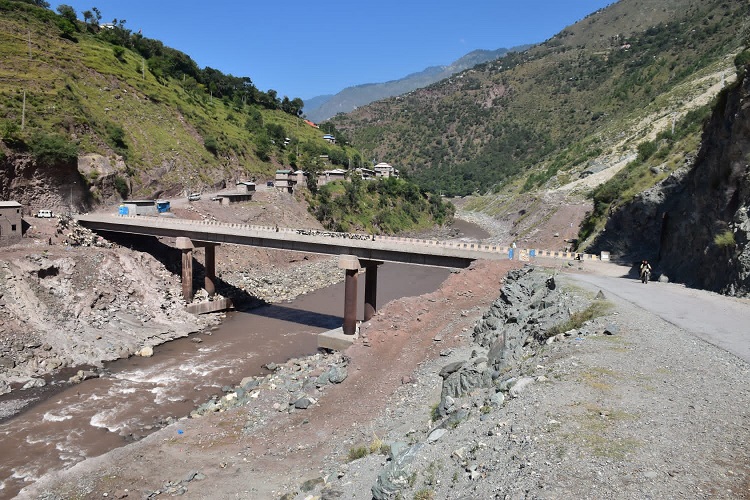Except those living in Karachi, Pakistani electricity consumers are familiar with the Neelum-Jhelum Hydroelectric Project - until recently, they were paying a 10 paisa surcharge on their electricity bills, mean to funds the construction of the project in Azad Jammu and Kashmir.
The collection of this surcharge continued until the end of the year 2020, as reported in the English Daily Dawn in February 2021. The work on the project, though, had been completed long before that - in August 2018. The newspaper said that the Water and Power Development Authority (Wapda) had collected about Rs 100 billion from the surcharge levied on electricity bills.
On the other hand, in its submission to the National Electric Power Regulatory Authority (NEPRA) on February 12th, 2021, Wapda admitted spending over 69.29 billion rupees of funds collected through the surcharge on electricity bills on the dam project. What it did not explain was what happened to the rest of the funds.
Another English daily Express Tribune reported that the Economic Coordination Committee of the cabinet decided to investigate the collection of extra levy on electricity consumers across the country. However, there is no information available on these investigations, resulting in no action against officials responsible for its collection, and refunding the money collected to the general public.
Amjad Ali Khan, a lawyer in Muzaffarabad, the capital of Azad Jammu and Kashmir, said that the extent of irregularities and corruption was far higher than the mere collection of a levy long after the project was completed. Khan, 60, is currently pleading several cases in the Azad Jammu and Kashmir courts, highlighting the project’s adverse social, environmental and financial impacts.
He said the Auditor General of Pakistan (AGP), who is responsible for financial oversight of public sector construction projects, has also pointed out several drawbacks in the Neelum-Jhelum Hydroelectric Project. However, the government has neither offered any explanation for these objections nor identified the responsible officials and departments.
Multiple Delays, Rising Cost
The Neelum-Jhelum Hydroelectric Project diverts Neelum River water through 38 kilometers long tunnels, about 41 kilometers upstream of Muzafarabad. Through these tunnels, the diverted Neelum's waters are poured into River Jhelum near Chatter Kalas and the hydropower stations there, producing over 969 megawatts of electricity.
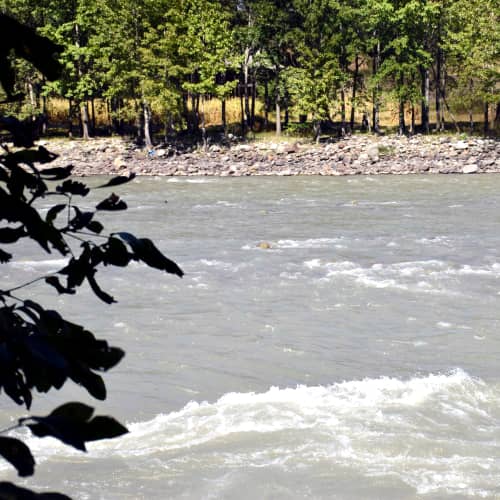 Neelum River water flow before the commencement of the power project
Neelum River water flow before the commencement of the power projectWapda had proposed the project for the first time in 1983. Back then, it was called the Neelum-Jhelum-Kohala Hydel Complex. Some four years later, Wapda engineers surveyed the area to work out a construction scheme for the project.
In 1989, the Executive Committee of the National Economic Council allocated Rs 15 billion for the construction of the project. Work on the project could not be launched, however, due to the government’s failure to arrange funds for the project.
In October 1997, a Norwegian firm, Norplan Consulting Engineers and Planners prepared the project design and several other documents detailing technical and construction requirements for the project and its bidding procedure. The project was also renamed the Neelum-Jhelum Hydroelectric project. Based on these documents, the project’s PC1 - a detailed official document covering all aspects of a project - was prepared in 2002. It was approved the same year.
Even after the approval of this second project plan, its construction could not start due to the unavailability of funds. The project site was affected by the devastating earthquake on October 8th, 2005. Regardless, an AGP report presented before the Public Accounts Committee in 2018 stated that the Wapda did not consider it necessary to change the project design.
In March 2007, the project was awarded to a consortium of two Chinese companies including China Gezhouba Group and China National Machinery Import and Export Corporation. Among the conditions of the award was completion of the project by the year 2015.
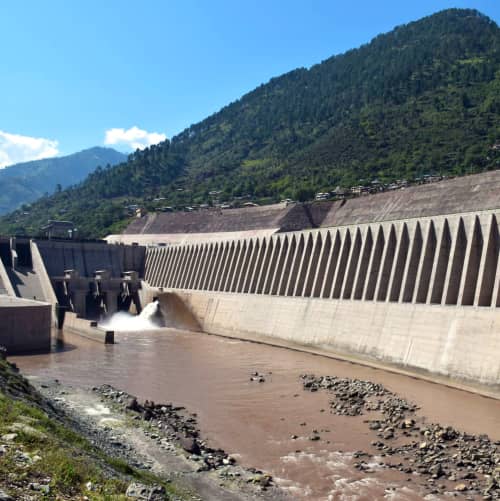 Neelum River after flow after the construction of the power project
Neelum River after flow after the construction of the power projectHowever, it occurred to the Wapda in May 2008 that the project design required a second review in the aftermath of the earthquake. A consortium of national and international consultants by the name of Neelum-Jhelum Consultants got the contract for review. The AGP report said that delay in the appointment of these consultants caused losses worth several billion to the national exchequer.
All this time, with the government neither arranging funds for the project nor providing electricity at the project site, work could not start on the project till 2010. Throughout this time, the government kept paying heavy sums to the contractors and other experts hired for the project.
In the same year, the AGP report said, Wapda also decided to go for boring machines to drill project tunnels instead of using explosives for the purpose. Work with drilling tunnels could not be completed by 2015 despite using modern machinery.
These factors led to the ballooning of project cost which jumped from 84.5 billion rupees in the second revised PC1 in 2002 to 4 trillion rupees in the third PC1 in 2015. Over the years, the cost has continued to surge. Wapda documents submitted to the NEPRA in February 2020 showed that the project cost had jumped to 4.26 trillion rupees. However, the project cost available on Wapda website puts the total expenditures at around 5.6 trillion rupees in the final PC-1 prepared in May 2018.
Even if we consider the figures that Wapda provided to Nepra as correct one, then the project cost is over 3.43 trillion rupees higher than the initial estimates. The AGP report blamed the inordinate delay in the completion of the project for the extreme cost surge.
Damning AGP disclosures
The AGP has detailed the financial irregularities and corruption committed in the Neelum Jhelum Hydroelectric Project at great length in his report. The report said that in December 2007, even before the hiring of the project consultants, the government paid 90 billion rupees to the consortium of companies working on the project. Interestingly, the review of project design was still pending at the time of payment after the earthquake. The AGP report said that this payment was in violation of those Planning Commission regulations that provide for implementation of financial and technical standards on any government construction project.
Also Read
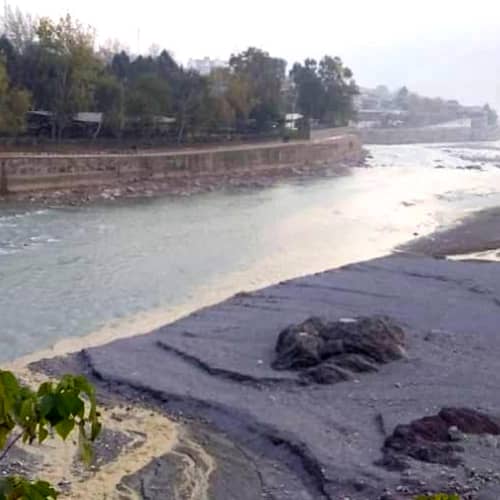
Death of a river foretold: How faulty planning has brought about Neelum River's doom
When the issue of this payment was taken up with the project administrators, they said that the process of hiring foreign consultants was a difficult one. “The region’s security situation deteriorated after the terrorist attack of 9/11, while the October 2005 earthquake further exacerbated this situation,” said the project management. It said that soon after the situation improved, they hired experts for design review and work oversight in 2008.
However, the AGP termed this explanation unsatisfactory, saying it failed to answer the question of why the contracting companies were paid before hiring of project consultants.
The report also added that three Pakistani laborers were killed and 14 injured when the roof of one of the tunnels collapsed on May 31st, 2015. The incident also resulted in damage to boring machinery, causing another long delay of seven months and a loss of 30 billion rupees.
The logistics director of the project blamed insufficient arrangements made by the contractors as a reason for the roof collapse. However, Wapda instead of penalizing the contractors made payments amounting to over 175 million rupees to cover the cost of treatment of injured laborers, compensation to families of the dead and improvement of safety arrangements inside the tunnels.
For its part, the AGP termed these payments lacking any justification. However, the project management in December 2016 said that the roof collapse was an accident. It said that foreseeing such an eventuality was not possible even for the most experienced contractor.
The audit report said the project consultants failed to comprehensively gauge the design and construction work standards, leading to changes that cost the national kitty 86 billion rupees.
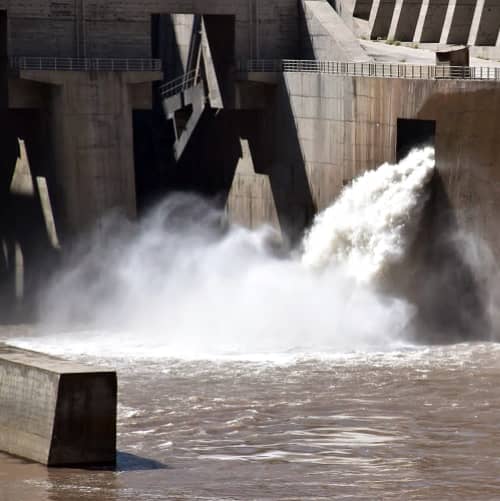 Water is being thrown into the Neelum River through tunnels
Water is being thrown into the Neelum River through tunnelsThe auditor went to the extent of declaring the payment of 16 billion rupees to the consultants a wastage of funds.
Besides, the auditor also criticized the purchase of vehicles for the project.
The report said that in light of the first PC1, 87 vehicles were purchased for the project. However, only 60 per cent of them were made available at the project site, while 40 per cent were used at the Wapda headquarters in Lahore.
In 2012, under the second PC1, another 18 vehicles were purchased at the cost of 196 million rupees. Three years later, yet another batch of 25 vehicles was purchased at the cost of 184 million rupees. Auditors said this later purchase of 25 vehicles was without any justification.
Amjad Ali Khan said that even when he pointed out all these matters, project managers were neither questioned nor the project contractors called to account. “We can infer from this that the court, laws and public are powerless before major companies and bureaucracy,” he added.
Published on 18 Dec 2021
